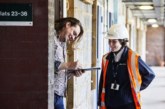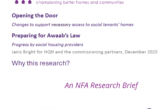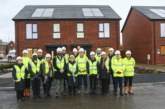The Institution of Structural Engineers (IStructE) has written to the Secretary of State for the Department Levelling Up, Housing and Communities (DLUHC) to express its concern that the regulation of embodied carbon has been omitted from the Future Homes and Future Buildings Standards consultation.
The Institution sees this as a missed opportunity to regulate embodied carbon to meet the UK’s net zero legal commitments.
IStructE explains that previous commitments from the Department to consult on embodied carbon regulation would have made this consultation the perfect occasion to gain feedback from industry.
IStructE believes that such regulation is already welcomed, with wide support for the net zero carbon building standard as evidenced by the 200+ statements of support for Part Z, including from household names such as Barratt Homes, British Land and NatWest.
IStructE’s letter also highlights their concerns to the Secretary of State about the phrase “net zero ready” being used in the consultation to only refer to operational carbon emissions.
This is despite that half the lifetime emissions of a new home being due to embodied carbon, which accounts for 10% of UK emissions and is a figure that continues to rise as the national grid decarbonises. IStructE suggests that this could leave the UK open to legal challenge on whether the legislation meets net zero commitments.
Will Arnold, Head of Climate Action at IStructE, commented: “It’s disappointing that embodied carbon was excluded from the consultation. Our letter urges DLUHC to consider consistent regulation, aligning the UK with global standards. Our view is that a building is only net zero if its whole life carbon emissions are considered.”
Patrick Hayes, Technical Director at IStructE concluded: “Introducing embodied carbon regulation provides certainty, consistency and efficiency for all parties on how to meet our legal obligations. It ultimately reduces the burden on business and reduces costs of transitioning to net zero by introducing a level playing field.”
The letter includes a recent policy paper from IStructE along with 10 other major institutions and organisations in the built environment sector which asks in this 2024 election year for political leaders to commit to reducing embodied carbon emissions in construction within two years of starting government.
Such a move is needed urgently because the materials used in buildings and construction are responsible for 10% of UK carbon emissions, a main driver of climate change.










